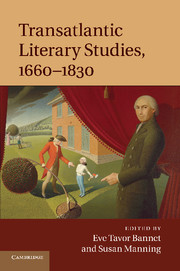Book contents
- Frontmatter
- Contents
- Notes on contributors
- Acknowledgements
- Introduction: British and American genres
- Chapter 1 Transatlantic books and literary culture
- Chapter 2 Transatlantic utopianism and the writing of America
- Chapter 3 Tales of wonder, spiritual autobiographies, and providence tales
- Chapter 4 Life writings
- Chapter 5 Benjamin Franklin and transatlantic literary journalism
- Chapter 6 Theatre, drama, performance
- Chapter 7 Transatlantic American Indians
- Chapter 8 Literature of the ocean
- Chapter 9 “To gird this watery globe”
- Chapter 10 Ghostly and vernacular presences in the black Atlantic
- Chapter 11 Susanna Rowson and the transatlantic captivity narrative
- Chapter 12 Domestic fiction and the reprint trade
- Chapter 13 Transatlantic Gothic
- Chapter 14 Transatlantic Romanticisms
- Chapter 15 Journeys of the imagination in Wheatley and Coleridge
- Chapter 16 Transatlantic historical fiction
- Further reading
- Index
- References
Introduction: British and American genres
Published online by Cambridge University Press: 05 January 2012
- Frontmatter
- Contents
- Notes on contributors
- Acknowledgements
- Introduction: British and American genres
- Chapter 1 Transatlantic books and literary culture
- Chapter 2 Transatlantic utopianism and the writing of America
- Chapter 3 Tales of wonder, spiritual autobiographies, and providence tales
- Chapter 4 Life writings
- Chapter 5 Benjamin Franklin and transatlantic literary journalism
- Chapter 6 Theatre, drama, performance
- Chapter 7 Transatlantic American Indians
- Chapter 8 Literature of the ocean
- Chapter 9 “To gird this watery globe”
- Chapter 10 Ghostly and vernacular presences in the black Atlantic
- Chapter 11 Susanna Rowson and the transatlantic captivity narrative
- Chapter 12 Domestic fiction and the reprint trade
- Chapter 13 Transatlantic Gothic
- Chapter 14 Transatlantic Romanticisms
- Chapter 15 Journeys of the imagination in Wheatley and Coleridge
- Chapter 16 Transatlantic historical fiction
- Further reading
- Index
- References
Summary
Anglophone literary scholarship with a transatlantic inflection or focus has become increasingly prominent during the past fifteen or twenty years. The emerging field has been surveyed, subdivided, argued over, theorized, and institutionalized in new journals and degree programs, as well as in learned societies and landmark texts. Like parallel developments in Atlantic history and oceanic geography, transatlantic literary studies have been hailed as innovatory, radical, and “postnational” – and almost as quickly declared parochial, linguistically imperialist, or otherwise politically suspect. With the advent of Hemispheric and Global literary studies, some have been tempted into even broader and less easily generalizable spaces. But there are compelling historical, methodological, and literary reasons for keeping a spotlight on Anglophone transatlantic literary exchanges during the period covered by this book – not least of which is that transatlantic relations were so central to Britons’ and Americans’ everyday lives, literary imaginations, and histories, and that so much primary recovery work of sources and contacts remains to be done. In this volume of essays we have therefore enlisted scholars from both sides of the Atlantic both to take stock and to address anew what are at present the principal issues and topics in seventeenth- to early nineteenth-century Anglophone transatlantic literary studies. The area is large in every sense, and stringent principles of selection have been necessary to produce a book that, we hope, will be readable, informative, and generate further work. In this introduction we lay out the grounds for transatlantic connections and explain the rationale for the essays’ inclusion and approach.
Even before seventeenth-century English settlement on the eastern seaboard, the history and cultural imagination of English speakers was entwined with the idea of a “new world” of material, social, and erotic promise. “Oh my America, My new found land!” John Donne eulogized his mistress. As Wil Verhoeven argues below, between More's Utopia and Charles Brockden Brown, on both sides of the ocean, utopian America-centered “mythmaking” continued to color the era's empiricism and to shape political arguments among British and American Whigs and Tories. Britain and America were linked, as much as anything else, by what Joel Pace calls “Imag-I-Nations.” They were also linked more prosaically by people on the move. Alongside successive waves of emigration which Britons feared would depopulate the kingdom, these included visitors and sojourners of all kinds. There were Americans visiting Britain for purposes of education or trade, as agents of provincial assemblies, refugees from wars and revolutions, or emissaries from the new Republic. American Indians made the crossing to see the British king, to raise money for Indian schools, or to make their voices heard. African slaves were carried to Britain by their American or West Indian masters, some remaining as free citizens. British servants, commercial factors, Christian missionaries, and government officials and their families stayed some years in America and returned. Mariners, travelers, soldiers, and fortune-seekers passed through, while British actors and theatrical troupes went out for longer or shorter tours in American theatres. On land and at sea in this multinational Atlantic world, Britons and Americans repeatedly encountered others who resisted incorporation, even as they were themselves unwillingly incorporated through captivity in the societies of others. British and American treatment of others and by others was a key part of transatlantic experiences, and, increasingly, of violent differences and debate.
- Type
- Chapter
- Information
- Transatlantic Literary Studies, 1660–1830 , pp. 1 - 9Publisher: Cambridge University PressPrint publication year: 2011
References
- 1
- Cited by



